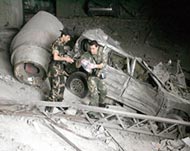Investors in Lebanon stay put
Despite political uncertainty, a string of bombings and a consequent slump in tourist revenues, investors in Lebanon are staying put, analysts say.

Lebanon was plunged into its worst political turmoil since the 1975-1990 civil war by the assassination of former prime minister Rafiq al-Hariri, a billionaire widely seen as Lebanon‘s best hope for economic recovery.
So far, bankers say capital flight abroad has been limited despite an increasing switch to dollar savings inside Lebanon, while pressure on Lebanon‘s pound has drained central bank reserves but at a manageable rate.
“Everybody is staying put, and waiting to see what happens. Anyone who wants to pull out his money, pulled out his money a month ago,” Daniel Ragette, senior vice-president at Beirut-based Middle East Capital Group, said.
“It is all based on a belief that in the near-term things will change for the better. Everybody will have to reassess the situation after two months.”
Subdued reaction
Analysts say the subdued reaction might not last if parliamentary elections due at the end of May are delayed or if a post-election cabinet does not launch long-promised reforms, such as privatisation, to cut debt and liberalise the economy.
An election postponement has become more likely with delays in the formation of a new cabinet since the last one collapsed amid deep political divisions in the country of about four million.
 |
|
Despite four bombings, calm has |
Lebanon can ride out the storm until after the election, presuming the elections take place on schedule, said Fitch sovereign analyst Richard Fox.
“The problems start to arise if the political uncertainty lasts longer than that.”
Central bank reserves have dropped by almost $2 billion to about $9.5 billion since mid-February, as the central bank has defended its 1501-1514 pound peg to the dollar.
But bankers say most of the pressure on the pound came in the first few weeks after al-Hariri’s killing, which scared off tourists who had been visiting in their droves and providing the country with a vital source of tax and other revenues.
Relative calm has returned to the currency market since then, despite four bombings in two weeks in and around Beirut.
Key indicator
Analysts say another key indicator is the fate of deposits in Lebanon‘s banks which are big holders of government debt.
Those debts were about $36 billion at the end of 2004, or 184% of gross domestic product (GDP).
“Bank deposits are the key variable. If people were taking their money out of Lebanon, then that would be a danger sign, because that means there are less deposits with which to sustain the public sector debt,” Fox said.
|
“People are taking it |
But there has been no sign of panic. The central bank said in mid-March deposits worth $609 million had left the country in the first two weeks of March, a tiny portion of the total deposits of about $55 billion, almost three times the size of the economy.
Analysts say depositors have proved resilient because they are mostly resident or non-resident Lebanese or from elsewhere in the Middle East, particularly the oil-booming Gulf.
But Lebanon cannot rely on the indefinite patience of depositors.
“People are taking it day-by-day,” one Lebanese currency dealer said. “It’s a bit difficult to have a long-term view now.”